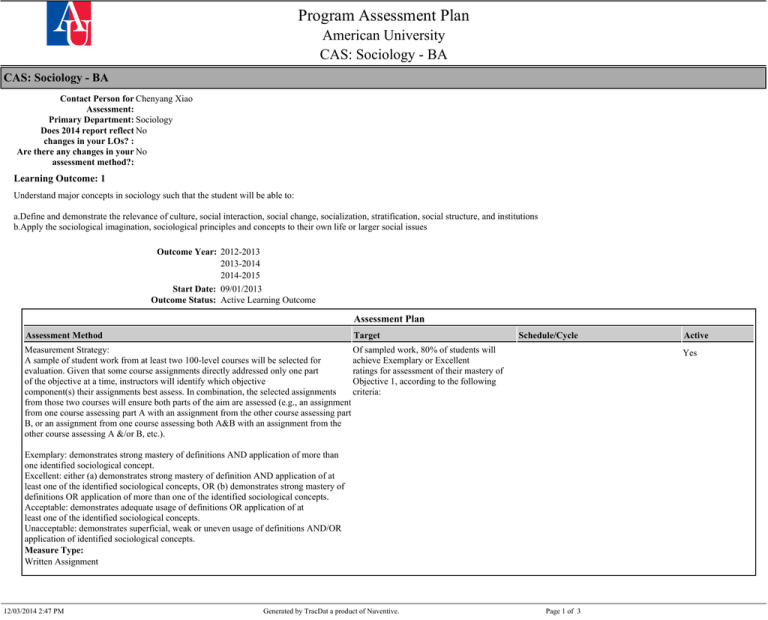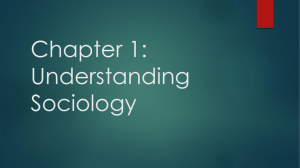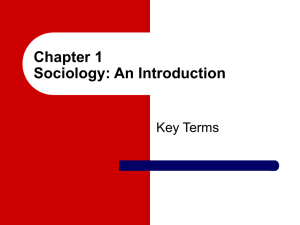Program Assessment Plan American University CAS: Sociology - BA
advertisement

Program Assessment Plan American University CAS: Sociology - BA CAS: Sociology - BA Contact Person for Chenyang Xiao Assessment: Primary Department: Sociology Does 2014 report reflect No changes in your LOs? : Are there any changes in your No assessment method?: Learning Outcome: 1 Understand major concepts in sociology such that the student will be able to: a.Define and demonstrate the relevance of culture, social interaction, social change, socialization, stratification, social structure, and institutions b.Apply the sociological imagination, sociological principles and concepts to their own life or larger social issues Outcome Year: 2012-2013 2013-2014 2014-2015 Start Date: 09/01/2013 Outcome Status: Active Learning Outcome Assessment Plan Assessment Method Target Schedule/Cycle Of sampled work, 80% of students will Measurement Strategy: achieve Exemplary or Excellent A sample of student work from at least two 100-level courses will be selected for ratings for assessment of their mastery of evaluation. Given that some course assignments directly addressed only one part of the objective at a time, instructors will identify which objective Objective 1, according to the following component(s) their assignments best assess. In combination, the selected assignments criteria: from those two courses will ensure both parts of the aim are assessed (e.g., an assignment from one course assessing part A with an assignment from the other course assessing part B, or an assignment from one course assessing both A&B with an assignment from the other course assessing A &/or B, etc.). Yes Exemplary: demonstrates strong mastery of definitions AND application of more than one identified sociological concept. Excellent: either (a) demonstrates strong mastery of definition AND application of at least one of the identified sociological concepts, OR (b) demonstrates strong mastery of definitions OR application of more than one of the identified sociological concepts. Acceptable: demonstrates adequate usage of definitions OR application of at least one of the identified sociological concepts. Unacceptable: demonstrates superficial, weak or uneven usage of definitions AND/OR application of identified sociological concepts. Measure Type: Written Assignment 12/03/2014 2:47 PM Generated by TracDat a product of Nuventive. Active Page 1 of 3 Related Action Steps * Supporting Assessment: NA Description: The committee examined all syllabi for 100-level courses (representing 15 sections of three different courses ? SOCY 100, SOCY 110 & SOCY 150). From these syllabi, we evaluated whether, how thoroughly, and how varied these courses were in their inclusion of this new learning objective. The assumption (and aim) was that all (100%) of the courses would incorporate multiple concepts from each part of the objective - in both their descriptions of included course content and evaluation elements. From the ways those courses incorporated this aim, the committee constructed the following target & rubric, which will be applied in the future to student work from these courses to assess mastery of Objective 1. Each course incorporated content and assignments that would be appropriate to assess both parts of the objective; for some courses, separate assignments assess part A & B, while others incorporate both elements into single assignments. The measures, target and rubric for this new Assessment plan is provided for Learning Objective 1. Learning Outcome: 2 Understand sociological theory such that the student will be able to: a.Define theory and describe major components of key sociological theories b.Compare and contrast different sociological theories c.Identify how theory can be applied to given topics of interest Outcome Year: 2012-2013 2013-2014 2014-2015 Start Date: 09/01/2013 Outcome Status: Active Learning Outcome Learning Outcome: 3 Understand research methods in sociology such that the student will be able to: a.Compare and contrast methodological approaches for gathering data b.Critically assess the methodology of published research c.Identify how methodological approaches can be applied in relation to a research question Outcome Year: 2012-2013 2013-2014 2014-2015 Start Date: 09/01/2013 Outcome Status: Active Learning Outcome Learning Outcome: 4 Understand inequalities within and across societies such that the student will be able to: a.Describe the various impacts of inequalities based on race/ethncity, class, gender, and sexualities b.Discuss social factors that create and perpetuate inequalities Outcome Year: 2012-2013 2013-2014 2014-2015 Start Date: 09/01/2013 Outcome Status: Active Learning Outcome 12/03/2014 2:47 PM Generated by TracDat a product of Nuventive. Page 2 of 3 Learning Outcome: 5 Use sociological knowledge to develop ways to address social inequalities. Outcome Year: 2012-2013 2013-2014 2014-2015 Start Date: 09/01/2013 Outcome Status: Active Learning Outcome Assessment Plan Assessment Method Target Schedule/Cycle The committee selected and examined a random selection of 10 capstone papers to determine how well they met the "use" objective #5. Mastery of the objective was assessed according to the following rubric criteria: Exemplary: Evidence that the student has mastered objective is provided, convincing, and at a high level. Excellent: Evidence that the student has mastered objective is provided and is convincing. Acceptable: Evidence that the student has mastered objective is provided, but is unconvincing or incomplete. Unacceptable: Evidence that the student has mastered objective is not provided, unconvincing or incomplete. Measure Type: Final Paper/ Final Project 80% of students reviewed will meet "Exemplary" or "Excellent" standards for mastery of the objective (see measure for rubric description). First step: Collection of samples of student Yes presentations and student papers and creation of rubrics for the assessment of these measures by the undergraduate assessment committee (during summer 2013) Second step: assess the samples using the rubrics and report assessment results by Oct 1, 2013 Related Courses - SOCY-492 - Major Seminar in Sociology 12/03/2014 2:47 PM Generated by TracDat a product of Nuventive. Page 3 of 3 Active





